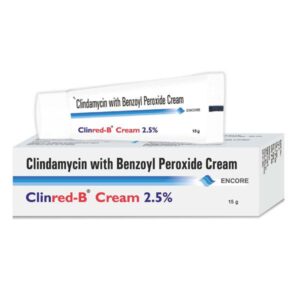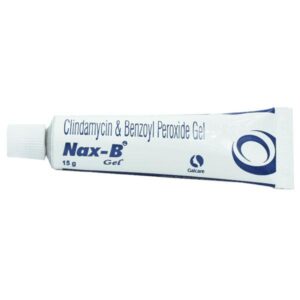CLINDAMYCIN + BENZOYL PEROXIDE
Clindamycin: Clindamycin is an antibiotic medication that is used to treat various types of bacterial infections. It belongs to the lincosamide class of antibiotics and is commonly prescribed for skin and soft tissue infections, respiratory tract infections, bone and joint infections, and certain types of vaginal infections.
The mechanism of action of Clindamycin involves inhibiting bacterial protein synthesis. It binds to the bacterial ribosome and prevents the addition of new amino acids to the growing peptide chain, thereby inhibiting bacterial growth and reproduction.
The dosage of Clindamycin can vary depending on the type and severity of the infection. It is available in several formulations, including oral capsules, oral suspension, and intravenous injection. The dosage may also depend on the patient’s age, weight, and renal function. It is important to follow the prescribed dosage and complete the full course of treatment, even if symptoms improve before the medication is finished.
Like all medications, Clindamycin has potential side effects. Common side effects include nausea, vomiting, diarrhea, abdominal pain, and skin rash. Less common but more serious side effects may include severe allergic reactions, such as difficulty breathing, swelling of the face or throat, and hives. It is important to seek immediate medical attention if any of these symptoms occur.
Additionally, Clindamycin can cause a condition known as pseudomembranous colitis, which is an inflammation of the colon caused by the overgrowth of a bacteria called Clostridium difficile. Symptoms may include severe diarrhea, abdominal pain, and fever. If any of these symptoms occur, it is important to contact a healthcare provider immediately.
Overall, Clindamycin is an effective antibiotic for treating various bacterial infections. However, it is important to carefully follow the prescribed dosage and monitor for any potential side effects.
Benzoyl Peroxide: Benzoyl Peroxide is a medication used topically for the treatment of acne. It can be found in various forms such as creams, gels, and washes. It is a common over-the-counter medication and is also available by prescription in higher strengths.
Mechanism of Action:
Benzoyl Peroxide works by killing the bacteria that contribute to acne, mainly Propionibacterium acnes (P. acnes). It also helps to unclog pores by reducing the production of excess sebum (oil) and exfoliating the skin.
Use:
Benzoyl Peroxide is primarily used for the treatment of mild to moderate acne. It is effective against different types of acne lesions, including whiteheads, blackheads, pimples, and cysts. It is usually applied to affected areas of the skin once or twice daily. It is important to follow the instructions provided by the healthcare professional or the product label when using Benzoyl Peroxide.
Dose:
The dose of Benzoyl Peroxide can vary depending on the formulation and strength of the product. It is recommended to start with a lower strength product and gradually increase as tolerated. Generally, a thin layer of the medication is applied to the affected area, after washing and drying the skin thoroughly. It is important to avoid applying it to broken or irritated skin.
Side Effects:
Benzoyl Peroxide is generally well-tolerated, but it may cause some side effects, including:
1. Skin dryness: It can cause dryness, peeling, or redness of the skin, especially during the initial stages of treatment. Using a moisturizer can help alleviate this side effect.
2. Skin irritation: Some individuals may experience itching, burning, or stinging sensation at the application site.
3. Allergic reactions: Rarely, allergic reactions such as rash, hives, or swelling of the face, lips, or tongue, may occur. If any of these symptoms are experienced, medical attention should be sought immediately.
4. Bleaching of hair or fabrics: Benzoyl Peroxide can bleach hair and colored fabrics, so caution should be taken to avoid contact.
It is important to note that Benzoyl Peroxide may cause increased sensitivity to sunlight, so it is recommended to use sunscreen and limit sun exposure while using this medication.
As with any medication, it is advisable to consult a healthcare professional or pharmacist before using Benzoyl Peroxide, especially if one has sensitive skin or any pre-existing skin conditions.


